Choosing the Best Dog Food for Your Rottweiler
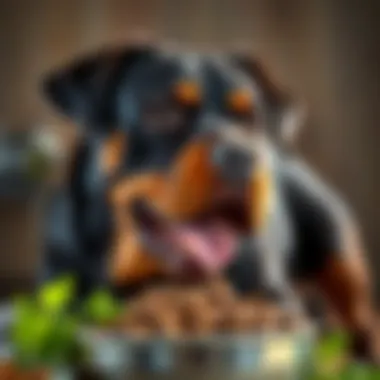
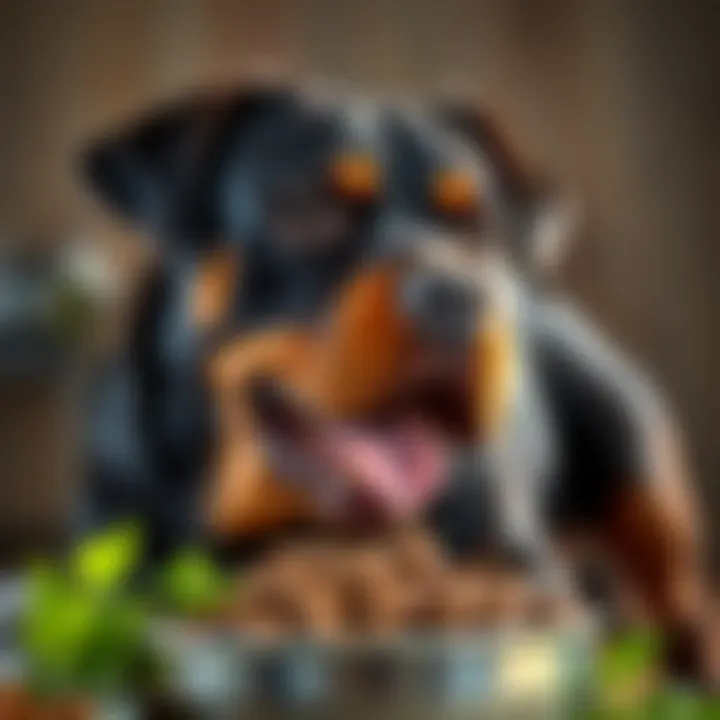
Intro
Understanding how to choose the right dog food for a Rottweiler is essential for any dog owner. Rottweilers are a large breed known for their strength and loyalty. Their unique nutritional needs must align with their physical characteristics and health considerations. This breed typically enjoys a robust appetite, but not all dog foods are created equal. When selecting food, it's crucial to consider the ingredients, nutritional balance, and specific life stage requirements. This article will break down the components every Rottweiler parent should look into, the common health issues related to diet, and how to make informed decisions.
Pet Care and Grooming
Understanding how to maintain proper pet care goes far beyond just feeding; it touches on grooming, health, and nutrition as well. Regular grooming not only keeps your canine companion looking sharp but can also alleviate health concerns. Rottweilers, with their short coats, require less grooming than some other breeds, but routine care still plays a role in their overall well-being.
Importance of Regular Care
Neglecting grooming won't just tarnish your dog's appearance. It can also lead to skin infections and coat problems. Regular brushing removes loose hairs and increases blood circulation. Plus, grooming serves as an opportunity to check for abnormalities like lumps or skin irritations. Keep a schedule as consistent as clockwork; it helps to forge a bond between you and your pet.
Grooming Techniques by Pet Type
For Rottweilers, using a slicker brush to smooth out their coat can be quite effective. This breed sheds year-round, so try to brush them once a week, or more frequently during shedding season. It's also a good time to check their ears and nails; clean ears help prevent infections and trimmed nails can safeguard against painful breaks.
Tools and Products Recommendations
Invest in a few quality tools: a slicker brush, grooming mitts, and dog-safe shampoo make for a well-rounded grooming kit. These tools are tailored for their short coats and can make the process smoother. Always opt for products that won't irritate their sensitive skin, which can be prone to allergic reactions.
Some Recommended Products:
- PetFusion Better Pet Supply Grooming Brush
- Burt's Bees All Natural Shampoo
- PetSpy Dog Training Collar
Seasonal Care Tips
When winter rolls around, pay attention to their paws. Ice and snow can accumulate between toes, causing discomfort. In summer, ensure they stay hydrated and avoid overheating. Regular checks for internal and external parasites should be a year-long commitment. Heat can also lead to lethargy, so accommodate their needs accordingly.
Health and Nutrition
Understanding Pet Nutrition
Nutrition forms the backbone of health. For a Rottweiler, finding the right balance of proteins, fats, and carbohydrates is key. Knowing their daily caloric needs can vary based on size, activity level, and age keeps diet aligned with energy requirements.
Common Health Issues by Species
Rottweilers are predisposed to certain health issues like hip dysplasia and heart problems. A poor diet can exacerbate these conditions, and feeding them a well-balanced diet might help minimize risks. Associating food choices with preventative care is invaluable.
Preventive Care and Regular Check-Ups
Regular veterinary check-ups can catch issues before they escalate. Discuss diet during these visits, and adjust according to professional advice. Preventative care goes hand-in-hand with proper nutrition for longevity and quality of life. Rottweilers thrive on structure, so consistent feeding routines also help.
Food and Dietary Advice
Choose a high-quality commercial dog food that specifies meat as the first ingredient. Brands like Wellness Core or Orijen often provide balanced nutrition tailored for larger breeds. Always watch out for fillers, preservatives, and artificial ingredients. They offer no benefit and can often lead to health complications.
Behavioral Training
Basics of Positive Reinforcement
Training is vital for Rottweilers, who are both intelligent and strong-willed. Utilizing positive reinforcement techniques promotes good behavior and enhances the owner-dog bond. Real-time rewards or treats can be particularly effective in yielding results.
Training Techniques Users Can Apply
Consistency is key with Rottweilers. They thrive on routine and predictability. Start with basic commands like "sit" or "stay." Make sure to use simple cues and provide immediate feedback to reinforce learning.
Managing Behavioral Issues
Behavioral problems can stem from a variety of factors: boredom, lack of training, or even diet deficiencies. If a Rottweiler exhibits aggression or anxiety, consulting a behavior specialist can provide essential insights.
Importance of Socialization
Socialization plays a critical role in developing a well-adjusted Rottweiler. Early exposure to different environments, sounds, and people can mellow their instincts. Engaging with other dogs can also help reduce potential aggression and fear-based behaviors.
Engaging Activities and Enrichment
Fun Games to Play with Your Pet
Rottweilers require mental and physical stimulation to thrive. Games like fetch or tug-of-war can be fantastic for engagement. Make use of structured activities to help them release pent-up energy.
DIY Toys and Activities
Creating your own toys can offer financial relief while providing mental stimulation. Simple items like water bottles, filled with treats, can keep your pup busy for hours. Look for safe direct alternatives to commercial toys.
Importance of Mental Stimulation
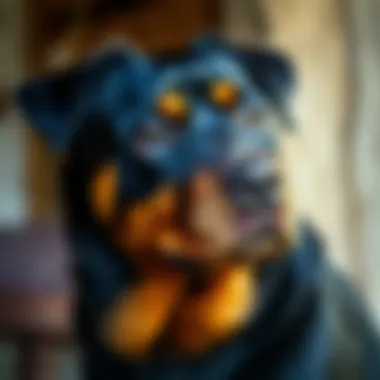
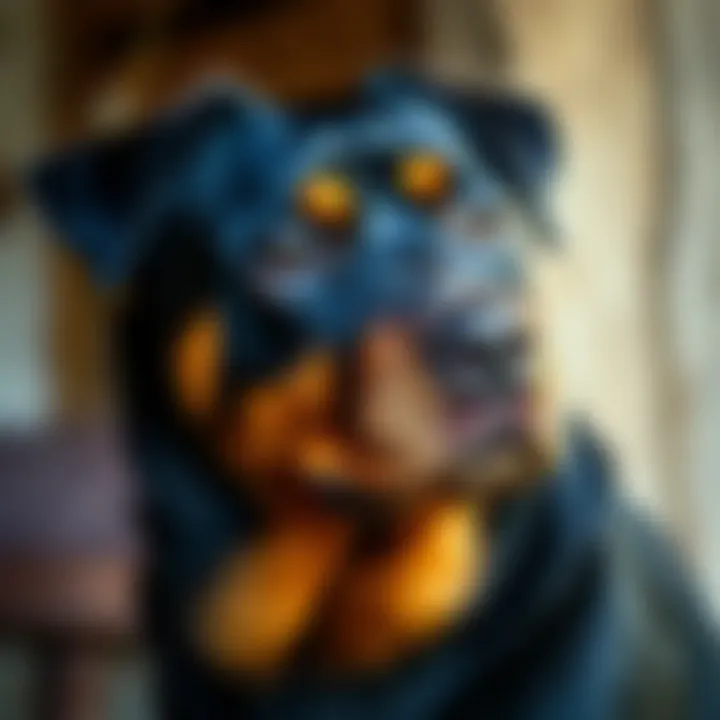
Puzzle toys and interactive feeding bowls can challenge their brains during mealtime. Mental exercise is as crucial as physical exercise, keeping them engaged and reducing behavioral issues.
Outdoor Adventures and Exploration
Time outdoors gives Rottweilers a chance to explore and interact with their surroundings. Regular walks or hikes allow them to utilize their energy well. Nature walks can also stimulate their senses, making them happier overall.
Resources and Community Engagement
Recommended Books and Websites
- The Rottweiler Handbook
- Rottweiler Rescue and Adoption
- American Kennel Club
Forums and Groups for Pet Owners
Online communities like reddit.com/r/rottweilers provide a space for owners to share advice, recipes, and tips. Joining groups can enhance learning about this breed.
Finding Local Services and Classes
Investigating local trainers and veterinarians can also offer tailored insights based on regional factors. Search for services that specialize in Rottweilers for a dedicated experience.
Encouraging Community Sharing and Contributions
Engaging with a community of Rottweiler owners can be invaluable. Share stories, photos, or tips on social media; it can build camaraderie and provide much-needed support among peers.
Adopting a Rottweiler comes with great rewards and responsibilities. By carefully considering diet, health concerns, and training requirements, owners can create a strong bond and a happy environment for their furry friends.
Understanding Rottweiler Nutritional Needs
In the quest for optimal health, understanding the nutritional needs of your Rottweiler is absolutely crucial. These dogs are known for their strength and loyalty, but like any breed, they require a diet that supports their specific growth, energy, and health needs. When it comes to Rottweilers, their dietary requirements are not one-size-fits-all. Instead, this is a breed that demands attention to detail regarding the composition of their food.
The Importance of Proper Nutrition
Proper nutrition is the foundation of a Rottweiler’s health. Neglecting this aspect can lead to a host of health issues, ranging from obesity to joint problems. Rottweilers are large and muscular dogs, and their bodies need to be fuelled with high-quality ingredients to keep them agile and healthy. Nutritional deficiencies can manifest in many ways, causing a decline in energy levels, skin issues, and even behavioral problems. For instance, a diet lacking in protein can lead to muscle loss and a weakened immune system, leaving your Rottweiler vulnerable to illnesses.
Key Nutrients for Rottweilers
Delving deeper, we find several key nutrients vital for Rottweilers, comprising proteins, fats, carbohydrates, and vitamins & minerals. Each plays an essential role in their diet, catering to everything from muscle development to overall wellness. Let’s break them down:
Proteins
Proteins are often regarded as the building blocks of life, and for Rottweilers, they are particularly important. These dogs require a higher protein intake than some other breeds due to their muscle mass. A diet rich in high-quality proteins aids in muscle development and repair, making it essential for active dogs. Lean meats, fish, and eggs are stellar sources. Just keep in mind that not all protein sources are created equal. For example, proteins from whole meats are more digestible and beneficial than those from by-products. A protein-rich diet not only supports healthy growth but also ensures a robust immune system.
Fats
Fats may sometimes get a bad rap, but for Rottweilers, they are crucial. They are a concentrated energy source, aiming to keep your dog lively during long activities. Healthy fats, such as omega-3 and omega-6 fatty acids found in fish oil, contribute not just energy but also enhance skin and coat health. It’s a common misconception that low-fat diets are better; however, Rottweilers need fats for proper nutrient absorption and to maintain their skin’s health. Just be cautious to steer clear of excessively high-fat foods, as they might contribute to obesity.
Carbohydrates
Carbohydrates serve as a quick source of energy but should be approached with care. For Rottweilers, the focus should be on complex carbohydrates like brown rice or sweet potatoes, which release energy slowly and help maintain steady blood sugar levels. While carbs are not the primary focus of a Rottweiler's diet, they can supplement their fuel needs effectively. However, it’s wise to remember that too many carbs can lead to weight gain, so balance is key.
Vitamins and Minerals
Vitamins and minerals, while often overshadowed by the main macronutrients, play a critical role in maintaining a Rottweiler's health. These micronutrients are essential for bone health, immune function, and preventing various diseases. Including a mix of fruits and vegetables in their diet can provide these essential nutrients. However, it’s important to ensure the correct amounts; excessive vitamins can also cause issues rather than helping. A good-quality commercial dog food should already have the right balance of these nutrients, but when in doubt, always consult your vet for recommendations.
"Nutrition is not just a part of Rottweiler care; it is the essence of it. A proper balance can lead to a happy, healthy dog."
In summary, knowing the nutritional needs of your Rottweiler is a fundamental step towards ensuring their longevity and vitality. By focusing on the right mix of proteins, fats, carbohydrates, and nutrients, you set the stage for your dog to thrive.
Life Stages and Dietary Requirements
Understanding the dietary landscape for Rottweilers throughout their lives is pivotal. Each life stage not only changes their nutritional needs but also impacts their overall health, energy levels, and well-being. By recognizing these variations, dog owners can effectively tailor their Rottweiler’s diet to what suits them best. It’s like dressing a child in layers; you wouldn’t put a winter coat on them in the middle of summer, right? Thus, adjusting dietary requirements is equally crucial, ensuring that your Rottweiler thrives at each phase of life.
Puppy Stage
This is the time when Rottweilers are brimming with growth and energy. During the puppy stage, their bodies are rapidly changing, and the right nutrition is essential for healthy development.
Growth and Development Needs
In this critical period, Rottweiler puppies require diets high in essential nutrients. These nutrients are the building blocks for strong bones, muscles, and overall health. Puppies grow at an astonishing pace; they can gain several pounds per week! This rapid growth necessitates a diet fortified with high-quality proteins, fats, and vitamins. For example, calcium and phosphorus are crucial for skeletal development. A diet balanced with the correct nutrient ratios is not just beneficial—it's a lifeline during this stage. If a puppy’s growth is stunted due to poor nutrition, the effects can linger far into adulthood.
Higher Protein Requirements
Let’s face it; growing pups need their protein fix. Higher protein levels are not just a preference; they are a necessity during this stage. Proteins are vital for building muscles and tissues, and they directly fuel your Rottweiler’s energy reserves. Typically, a puppy food will contain around 22-30% protein. This protein helps promote healthy muscle development and strong bones, making snacks like puppy-size kibble and soft loaves top-notch choices. While it might seem appealing to consider a lower protein diet to avoid risk of overfeeding, it’s critical to stick to suggested levels to maintain healthy growth and ongoing vitality.
Adult Rottweilers
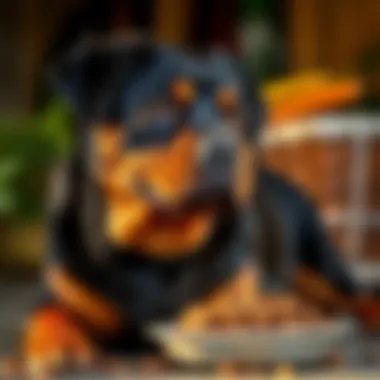
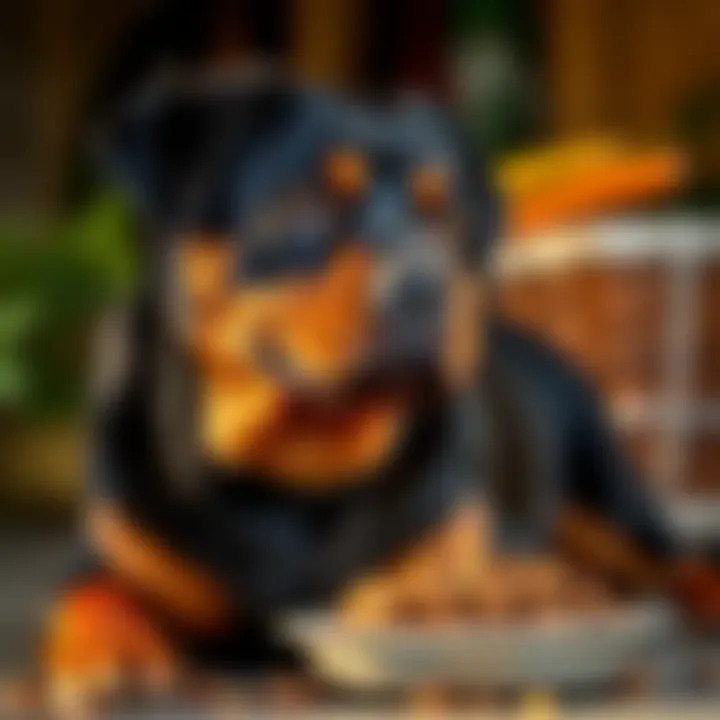
As Rottweilers transition into adults, their nutritional requirements shift again. Maintaining an optimal balance is vital for health across various activity levels, making this phase equally essential.
Maintaining Healthy Weight
An adult Rottweiler’s weight can fluctuate based on activity and lifestyle, making regular monitoring crucial. Obesity is a common concern, particularly for pet owners who may not realize how active their dog needs to be. The breed's physique means that they can gain weight rather quickly, so proper portion control and high-quality food are fundamental. Choosing foods that are specifically designed for managing weight is beneficial for keeping them trim and fit. It’s important to select a feed that considers both their size and energy needs, preventing unnecessary health issues such as diabetes or joint problems.
Balanced Nutrition for Active Life
Adult Rottweilers are energetic and need a diet rich in nutrients to support an active lifestyle. Foods that offer a balanced profile of proteins, fats, and carbohydrates serve not only to sustain energy but also to promote overall health. For active dogs, options like chicken, lamb, and fish ensure both enthusiasm in play and endurance. Good hydration is also a key component in maintaining their activity levels, so plenty of fresh water paired with nutrient-dense food is essential.
Senior Rottweilers
Age brings wisdom, but it can also bring specific dietary needs. Senior Rottweilers often require more attention to their diet and nutritional intake.
Reduced Caloric Needs
As Rottweilers age, their metabolism often slows down. This natural decline means their caloric needs will also decrease. It can be easy to overlook this, but feeding the same amount as in their active days can lead to weight gain and health complications. Opting for specially formulated senior dog food is a wise choice. This can help keep their weight steady without sacrificing the necessary nutrients they still need. Some owners might find it useful to measure their pet’s food or even consult with a vet for tailored advice.
Joint Health Considerations
With advancing age, joint health becomes increasingly important for Rottweilers. The weightiness of this breed can put extra stress on their joints, making it essential to consider dietary options that support joint health. Ingredients like glucosamine and omega-3 fatty acids are invaluable in these diets, promoting mobility and comfort. As arthritis becomes more common among older dogs, we must be proactive to aid their agility and reduce discomfort. Proper nutrition has the potential to dramatically affect their quality of life.
In closing, understanding the dietary requirements at various stages of your Rottweiler’s life is essential for their growth, health, and happiness. Tailoring their diet not only meets their needs, but sets them up for a thriving life.
Common Health Considerations for Rottweilers
Understanding the common health issues Rottweilers face is essential for any owner aiming to provide a long, healthy, and happy life for their canine companion. Rottweilers, while being robust and powerful dogs, can also be prone to specific health challenges linked directly to their anatomy, genetics, and dietary choices. Addressing these concerns early on can aid in preventing serious health complications and help in making informed decisions regarding their diet and care. In this section, we’ll delve into three major health considerations: hip and elbow dysplasia, bloat, and obesity. Each of these conditions has unique implications that influence not just the overall health but also the nutritional needs of your Rottweiler.
Hip and Elbow Dysplasia
Hip and elbow dysplasia are hereditary conditions understood by many caregivers but often underestimated in their impact. This often occurs when the joints do not fit properly into the hip or elbow socket, leading to pain and often debilitating arthritis in adulthood. It’s common in larger breeds, and sadly, Rottweilers are significantly at risk due to their size and weight distribution.
The role of nutrition in preventing joint issues is paramount. A diet that promotes proper bone and joint health can make a world of difference. Here are some key considerations:
- Calcium and Phosphorus Levels: Young Rottweilers need a careful balance of these minerals for growing bones. Over-supplementing can lead to problems, so finding the right food with natural ingredients is crucial.
- Omega-3 Fatty Acids: These help with inflammation and can promote joint health. Regular inclusion of fish oils or quality sources of fat can help manage symptoms.
- Weight Management: Keeping your Rottweiler at a healthy weight is essential. Extra weight means extra stress on the joints, potentially exacerbating dysplasia.
"A stitch in time saves nine" – Regular vet checks and a good diet can prevent bigger issues down the road.
Bloat
Bloat, also known as Gastric Dilatation-Volvulus, is a life-threatening condition that occurs when a dog's stomach fills with gas and eventually twists on itself. It’s a matter of urgency, affecting Rottweilers significantly due to their large and deep-chested builds. The risk factors associated with bloat can be related to dining habits and stress levels.
When transitioning to new foods or even regular feeding, the way Rottweilers consume their meals plays a key role. Here are some strategies for prevention:
- Slow Feeding: Using slow-feed bowls can help control how quickly they eat, reducing the chance of air intake.
- Meal Timing: It's advisable to feed smaller, more frequent meals instead of one large meal daily.
- Post-Meal Activity: Avoid vigorous exercise immediately after meals; waiting at least an hour allows their digestion to settle before playtime.
Obesity
Obesity is a growing concern for many dog breeds, and Rottweilers are no exception. Being overweight can lead to a host of health issues, from diabetes to worsening joint problems. It’s crucial to be vigilant about their weight and adjust food intake according to their age, activity level, and health status.
Important strategies to combat obesity include:
- Portion Control: Always adhere to feeding guidelines provided on commercial dog food. Measure out portions instead of using free-feeding methods.
- Regular Exercise: Engage in daily activities that suit your Rottweiler’s energy level. Rottweilers thrive on exercise, and regular activity can help keep their weight in check.
- Monitoring Treats: Treats can easily add extra calories. Opt for healthy snacks and keep track of the overall daily caloric intake to maintain a healthy weight.
Evaluating Commercial Dog Food Brands
When it comes to choosing the right food for your Rottweiler, evaluating commercial dog food brands is a pivotal step. Dogs, especially robust breeds like Rottweilers, thrive on quality nutrition tailored to their specific needs. With a plethora of options available on the market, making an informed decision becomes necessary to ensure your canine companion maintains optimal health. This section aims to dissect the main elements pertinent to evaluating dog food brands, helping pet owners grasp the various considerations involved.
Understanding Ingredient Lists
The ingredient list on dog food packaging might seem straightforward at a glance; however, a closer look reveals a treasure trove of information. The first step in evaluating any commercial dog food involves scrutinizing these lists. Ingredients are typically listed in descending order by weight, which means that the first few components are critical in understanding the food's quality.
Rottweilers require a protein-rich diet, so it is essential that high-quality protein sources, such as chicken, beef, or fish, are listed at the top. Moreover, be wary of vague terms like "animal by-products," which often obscure the food's nutritional profile. In addition to protein, look for healthy fats like fish oil and sources of carbohydrates like brown rice or sweet potatoes. These components contribute significantly to overall health and energy levels.
"A vigilant examination of ingredient lists empowers dog owners to sidestep poor-quality foods that can negatively impact their Rottweiler's health."
Identifying High-quality Ingredients
Once you've grasped the basics of ingredient lists, the next layer is to identify high-quality ingredients that contribute to your Rottweiler's well-being. High-quality dog foods tend to include specified animal proteins over generic terms. Instead of "meat meal," a bag that specifies "chicken meal" provides clearer insight into the food.
Additionally, look for whole ingredients that are easily recognizable. Natural preservatives such as tocopherols (vitamin E) are more favorable compared to synthetic options. Whole fruits and vegetables, such as blueberries or carrots, are another sign of quality, as they contribute vitamins and antioxidants that bolster the immune system.
A dog food containing actual, identifiable ingredients generally signals a commitment to quality. This could potentially have broader implications for digestion, coat health, and overall vitality in Rottweilers.
Brand Reputation and Reliability
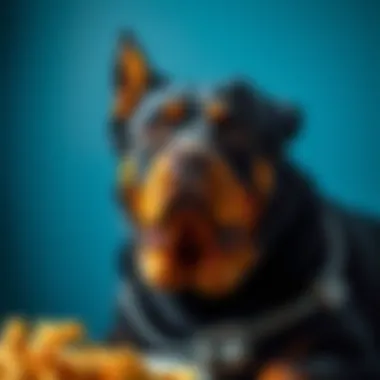
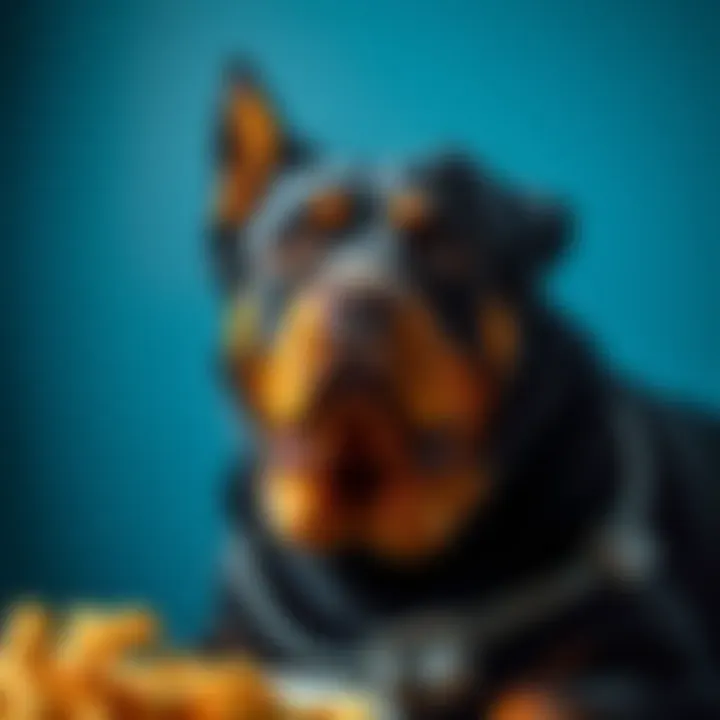
Before filling your cart with a brand of dog food, it pays to do a bit of homework on the reputation of that brand. An established company often indicates reliability. Search for reviews, both online and through word-of-mouth, to gauge customer satisfaction. Additionally, investigating whether the brand adheres to the standards set by organizations like the Association of American Feed Control Officials (AAFCO) can further affirm its credibility.
Consider the transparency of the brand: are they forthcoming about their sourcing and manufacturing processes? Brands that are willing to share this kind of information tend to prioritize the health of your Rottweiler. It's equally crucial to take note of recalls or safety violations; a brand's history in these areas can be quite telling.
Homemade Dog Food: A Viable Option?
When it comes to feeding Rottweilers, there's a growing interest among owners to craft homemade dog food. Many pet parents are motivated by the desire to provide their furry companions with the freshest, highest-quality ingredients. The reality is that just like humans, Rottweilers can benefit significantly from a diet tailored specifically to their nutritional needs. However, before embarking on the path of homemade meals, it's crucial to explore both the advantages and the potential pitfalls that come with this choice.
Benefits of Homemade Diets
Choosing to prepare dog food at home can carry several notable benefits:
- Control Over Ingredients: One of the most appealing aspects is the level of control an owner has over what goes into their Rottweiler’s food. With pre-packaged options, you might not know every subtle detail of the ingredients. In contrast, making meals from scratch allows you to use fresh proteins, whole grains, and vegetables, ensuring there are no fillers or unknown additives.
- Customization for Specific Needs: Every Rottweiler is different, and some may have specific dietary needs or preferences based on their health status or allergies. Homemade diets can be tailored precisely to meet these needs, allowing the incorporation of necessary vitamins and minerals while avoiding problematic ingredients.
- Enhanced Nutritional Value: The freshness of homemade dog food often translates into higher nutritional value. High-quality meats and vegetables generally have more bioavailable nutrients compared to some commercially produced options.
- Bonding Experience: There’s something to be said for the love that comes from preparing a meal for your dog. This is not just about sustenance; it’s about the bond built through the act of creating something specifically for them.
While the benefits are compelling, it’s equally important to acknowledge the responsibilities involved in cooking homemade dog food. Owners must ensure that these meals are well-balanced, containing all the necessary nutrients. Also, researchers from the University of California, Davis recommend consulting with a veterinary nutritionist to ensure a complete and adequate diet.
Risks and Nutritional Balance
Despite the benefits, making homemade meals for your Rottweiler can come with its own set of challenges and risks:
- Nutritional Imbalance: One of the most significant risks is the likelihood of creating an imbalanced diet. Rottweilers require a specific ratio of proteins, fats, carbs, vitamins, and minerals tailored to their age, weight, and health condition. A diet lacking in key nutrients can lead to serious health problems. Failure to provide balanced meals could lead to deficiencies or excesses, both of which might ultimately harm your dog's health.
- Time and Effort: Cooking for your dog isn't a quick evening task. It requires time, meal planning, and an understanding of proper portion sizes. For busy owners, preparing homemade meals might quickly become a burdensome chore.
- Safety Concerns: Preparing food at home comes with safety challenges. Ensuring that meat is cooked properly and avoiding contamination are paramount. Additionally, some human foods are toxic to dogs, so it's crucial to have thorough knowledge about which ingredients are safe.
"Homemade doesn't always mean healthy. Rottweiler owners must be educated about nutritional needs to safeguard their dogs' health."
Navigating these waters requires careful thought and dedication. If a decision is made to go the homemade route, sticking close to expert guidelines is essential. This approach provides both peace of mind and ensures your Rottweiler receives the best possible nutrition.
Special Dietary Needs and Allergies
Understanding the special dietary needs and allergies of your Rottweiler can make a significant difference in their overall health and well-being. These dogs, known for their strength and robust nature, are not immune to dietary sensitivities and allergic reactions. Recognizing these conditions is crucial for preventing discomfort and ensuring a long, happy life for your furry companion.
Identifying Food Allergies
Food allergies in dogs can manifest in various ways. Common symptoms include itching, digestive disturbances, or skin issues. If you notice your Rottweiler scratching more than usual, having loose stools, or developing rashes, it may be time to consider that their food could be the culprit. Here are some key points to help you identify food allergies:
- Common Allergens: Many Rottweilers are sensitive to common ingredients such as beef, chicken, dairy, wheat, and soy. If you're introducing a new food, keep an eye on them.
- Elimination Diet: This method involves removing potential allergens from their diet and slowly reintroducing them over time. Doing so will help pinpoint the exact source of the allergy.
- Veterinary Consultation: Always consult a vet when you suspect a food allergy. They might recommend specialized tests or diets to identify the problem.
Adjusting Diet for Sensitive Stomachs
Rottweilers can have sensitive stomachs that may not react well to sudden changes in their diet. Addressing this can prevent various health issues that arise from gastrointestinal upset. Here’s how you can adjust their feeding regimen to accommodate such needs:
- Consistent Diet: Stick to one brand and type of food for a specified duration. Abrupt changes can cause more harm than good.
- High-Quality Ingredients: Choose foods with identifiable ingredients. Sourcing your dog food from brands that prioritize high-quality, whole food ingredients can make a big difference. Look for options with meat as the first source of protein, minimizing fillers and artificial additives.
- Fiber Inclusion: Introducing a certain level of fiber into their diet can aid digestion. Ingredients such as sweet potatoes or pumpkin can be beneficial.
- Probiotics: Adding a probiotic supplement can promote gut health and improve digestion, potentially easing sensitive stomach issues.
Quick Tip: Monitor your Rottweiler’s reactions for a week or so after making any dietary alterations. This way, you’ll notice any signs of improvement or distress more quickly.
Managing special dietary needs is essential in keeping your Rottweiler healthy. Paying attention to their reactions to food and being proactive about any changes in their behavior can prevent long-term health problems. Always remember that your vet is your best resource when navigating food allergies or dietary adjustments.
Transitioning to a New Dog Food
When it comes to changing your Rottweiler’s diet, the transition is more than simply switching brands or flavors. The way that you ease your dog into new food can significantly affect their health and wellbeing. A sudden change in diet can lead to gastrointestinal problems like diarrhea or vomiting. Because Rottweilers are predisposed to certain health issues, managing their food transition carefully is crucial. In this section, we will explore the importance of a gradual introduction to new food and how to do it effectively.
Gradual Intro Strategies
Starting with a new dog food can be tricky. It's best to tread lightly and take a few steps to ensure the switch goes smoothly. Here are some effective strategies:
- Start Slow: Begin by mixing 25% of the new food with 75% of the old food. For the first few days, keep an eye on your Rottweiler's reactions. If everything seems to be going well, slowly increase the amount of new food.
- Monitor Quantities: Over about a week or so, gradually shift the proportion. Move to 50% old food, 50% new food for a further couple of days, before progressing to a 75/25 mix. The aim is to blend the new food into their regular meals gradually.
- Check the Ingredients: Ensure the new food has compatible ingredients. Sometimes dogs could be sensitive to certain proteins or grains. This compatibility is especially important for Rottweilers, who can have particular allergies or intolerances.
- Offer Variety: Changing flavors or textures might be necessary to maintain their interest in the new food. Mixing different forms, such as kibble and wet food, can keep mealtimes exciting.
- Stay Firm: If your dog shows any signs of discomfort or refusal to eat, don’t panic. Adjust the ratio, and revert to a more familiar mix until your dog settles.
Monitoring Health and Reactions
After introducing new food, it doesn't just stop with the gradual changes. Continuous monitoring is essential. Pay close attention to how your Rottweiler reacts:
- Gastrointestinal Issues: Look for signs like gas, bloating, or diarrhea. Initially, these might indicate that the transition was too abrupt or that they are not responding well to the new ingredients.
- Energy Levels: An active Rottweiler is often a happy Rottweiler. But if you notice lethargy or a lack of enthusiasm, it might suggest the new food isn’t meeting their energy needs.
- Coat and Skin Health: Fluctuations in coat quality can occur during dietary changes. Too dry, flaky skin or changes in coat brightness may mean that essential nutrients are lacking.
- Appetite Changes: Keep an eye on your dog's appetite cues. A flagging appetite could signify a problem with the food itself. Conversely, excessive hunger may indicate they require more volume or richer ingredients.
"The key to a smooth transition lies in patience and observation; both are your best friends in keeping your Rottweiler happy and healthy."
For more information on dog nutrition and health check resources like The American Kennel Club or PetMD.
Culmination: Making an Informed Decision
In the journey of choosing the right dog food for your Rottweiler, making an informed decision is crucial. The stakes are high, as what goes into your dog's bowl can dramatically influence their health and overall well-being. It’s not just about satisfying their hunger; it's about fueling their bodies with the right nutrients, helping them thrive and live their best lives.
When you peel back the layers of evaluating dog food, several key considerations consistently surface. First and foremost, understanding the nutritional requirements tailored to Rottweilers is a foundational step. It lays the groundwork for making choices that do justice to their physique and lifestyle demands. With their unique predispositions to certain health conditions, a well-chosen diet can act as a preventative layer.
Next comes the ingredient list. The temptation to go for a flashy brand or a popular choice can be strong, but taking a moment to rigorously analyze ingredients ensures that you’re not just buying marketing hype. Look for high-quality proteins, essential fats, and micronutrients that contribute to robust health and longevity. Remember, the food should nourish your pet, not fill up their tummy with empty calories.
Another vital element is the concern for age-specific requirements. As Rottweilers pass through different life stages — from playful pups to dignified seniors — their dietary needs shift significantly. Being vigilant about these changes can lead you to make timely adjustments that support their growth, maintenance, and overall vitality.
Additionally, consulting with a veterinarian can impart invaluable insights. They can offer tailored advice based on your Rottweiler’s health profile and lifestyle. It’s an step often overlooked but can be the difference between a healthy, happy dog and a slew of avoidable issues.
Final Considerations for Rottweiler Owners
- Research, Research, Research: Equip yourself with knowledge about dog nutrition, brands, and specific needs for Rottweilers. Resources like https://www.petmd.com and https://www.aaha.org can be invaluable in this quest for understanding.
- Listen to Your Dog: Pay attention to how your Rottweiler responds to different foods. Changes in behavior, coat quality, and stool health can offer clues about their suitability.
- Be Wary of Trends: Much like fashion, pet food trends come and go. Stick to evidence-based guidelines over flashy advertisements.
- Gradual Changes: If shifting to a new food, do it gradually to minimize digestive distress — a simple rule that keeps tummy troubles at bay.
- Stay Updated: Nutrition science is ever-evolving. Periodically revisit your dog’s diet to ensure it aligns with the latest findings and your pet’s changing needs.
By nurturing your dog with the best possible food choices, you're not just feeding them; you're investing in their future health. In essence, a thoughtful approach to your Rottweiler’s diet can pay dividends in their happiness, longevity, and quality of life. After all, they deserve nothing short of the best.















